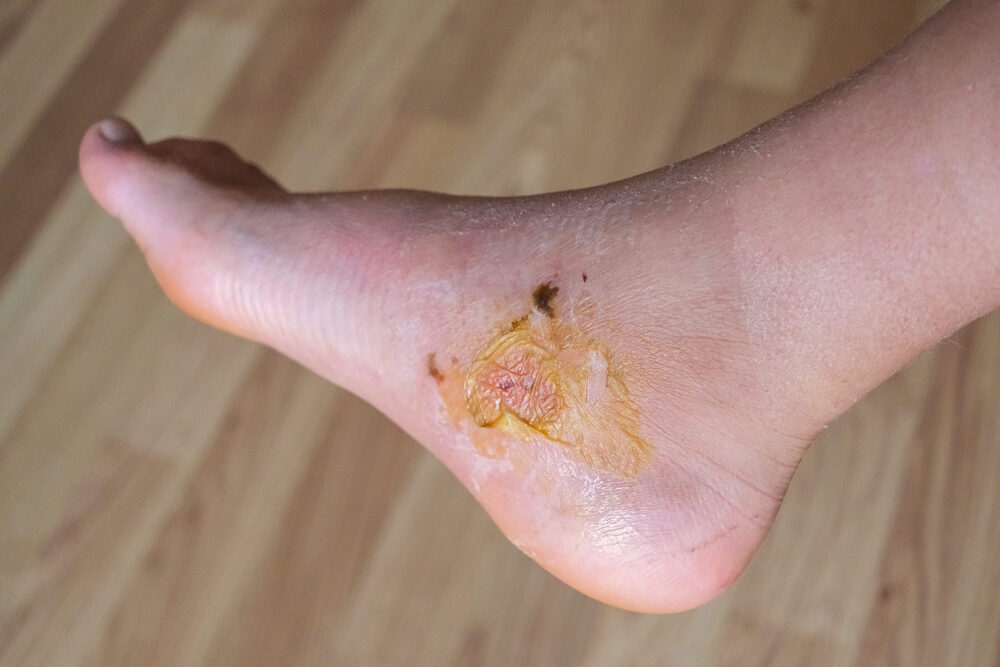Foot ulcers are a significant concern for individuals with diabetes, vascular diseases, or other underlying health conditions affecting blood circulation and nerve function. These open wounds on the feet can lead to severe complications if not properly managed. In this blog post, we'll explore the causes of foot ulcers, potential complications, and essential wound care techniques to promote healing and prevent further damage.
Causes of Foot Ulcers
- Diabetes: High blood sugar levels associated with diabetes can damage nerves (neuropathy) and blood vessels (vascular disease) in the feet, leading to reduced sensation and poor circulation, making the feet more susceptible to ulcers.
- Peripheral Arterial Disease (PAD): Narrowing or blockage of arteries in the legs and feet due to atherosclerosis can impair blood flow, increasing the risk of tissue damage and ulcer formation.
- Trauma: Injuries such as cuts, blisters, or pressure sores that fail to heal properly can progress into ulcers, especially in individuals with compromised healing abilities.
- Foot Deformities: Structural abnormalities like bunions, hammertoes, or Charcot foot can create areas of excessive pressure and friction, predisposing the feet to ulceration.
Complications of Foot Ulcers
- Infection: Open wounds provide a gateway for bacteria to enter the body, leading to localized infections (cellulitis) or systemic infections (sepsis) if left untreated.
- Tissue Necrosis: Lack of adequate blood supply to the ulcerated area can result in tissue death, increasing the risk of gangrene and the need for surgical intervention, such as amputation.
- Delayed Healing: Chronic ulcers may fail to heal despite standard wound care measures, resulting in prolonged pain, disability, and reduced quality of life.
Wound Care Techniques
- Offloading Pressure: Minimizing pressure on the ulcerated area through custom footwear, orthotic devices, or specialized shoes can help alleviate discomfort and promote healing.
- Wound Debridement: Removing dead or infected tissue from the ulcer site using surgical or non-surgical methods facilitates the growth of healthy tissue and prevents infection.
- Moist Wound Healing: Keeping the ulcer moist with appropriate dressings promotes cell migration, angiogenesis, and epithelialization, accelerating the healing process.
- Infection Control: Regular wound cleaning, antimicrobial dressings, and antibiotics (if necessary) are essential for preventing and treating infections associated with foot ulcers.
- Vascular Assessment: Assessing blood flow to the feet through non-invasive tests like ankle-brachial index (ABI) or Doppler ultrasound helps identify vascular issues that may impede healing and guide treatment decisions.
Conclusion
Foot ulcers pose significant challenges to individuals with diabetes, vascular diseases, or foot deformities, requiring comprehensive wound care strategies and multidisciplinary management. Early detection, prompt intervention, and diligent wound care are essential for preventing complications, preserving limb function, and improving overall outcomes for patients with foot ulcers.
Navigating Foot Ulcers: Expert Care at Oklahoma Foot and Ankle Associates
In the realm of foot health, understanding and managing foot ulcers are paramount to preserving mobility and preventing complications. At Oklahoma Foot and Ankle Associates, our team of experienced podiatrists, including Drs. Gordon Bean, Armando Carro, Scott Morris, and Steve Walker, is dedicated to providing comprehensive care for individuals dealing with foot ulcers.
We recognize the urgency and complexity of foot ulcer management, which is why we offer personalized treatment plans tailored to each patient's unique needs. Whether you're experiencing diabetic ulcers, pressure sores, or other types of foot wounds, our goal is to promote healing, prevent infections, and restore function.
For compassionate care and expert guidance on managing foot ulcers, contact Oklahoma Foot and Ankle Associates at our Edmond Office at (405) 340-9251 or our Moore/Midwest City Office at (405) 794-6691 or visit our website. Let us be your partners in navigating foot ulcers and restoring your foot health for a brighter tomorrow.











